Subscribe to ‘Words Of Hope’
Get our emails direct to your Inbox with updates about all our campaigns, trips and events.
Hello. Are you sitting comfortably? Welcome to 6 Stories, a literary update on our work from around the world.
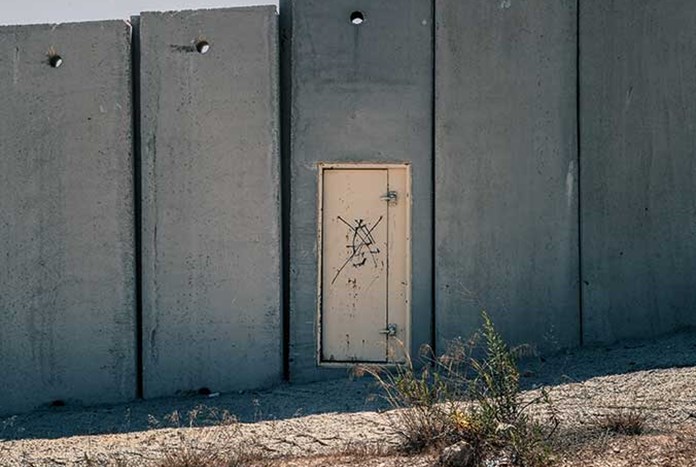
Hole in the Wall: A very small door in a very big wall. West Bank, Palestine.
— — — — — — —
As the writer, James Joyce once said, “in the particular is contained the universal.” For what is given as being uniquely ours is often what we most have in common with every other person on this planet.
So I chose these six stories as a jumping-off point, but I am already looking forward to the stories we will be telling in the future — about the eight young women activists in the first cohort of our Climate Fellowship Network and our Indian partner Karunalya’s preparations for the Street Child Cricket World Cup in 2023.
At a time when inconvenient truths are easily dismissed as false news, we need to listen more to the stories that people tell. So I hope that as you read these, you will understand more about the creative ways in which Amos Trust and our partners seek to challenge injustice, build hope and create change — whether that be in Palestine, with young women on the streets or in the face of the climate emergency.
Chris Rose, Amos Trust
— — — — — — —
1. Tea? Thank you
“We used to pray and ask God to protect the house, but in the end, it happened.” Lolo recounts the day her family’s home was demolished.
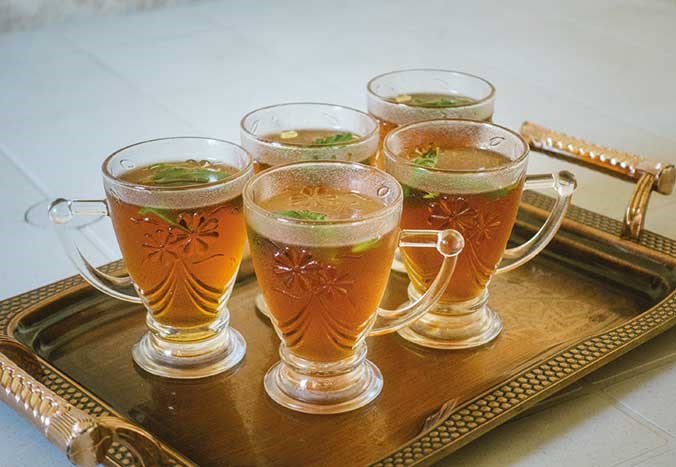
Tea time: Wagt alshaay
— — — — — — —
The eyes of those who had asked for tea were starting to follow the coffee jug around the room. How many more times would it go backwards and forwards between the group before the tea arrived?
Our guide, Said, senses the focus drifting away from his description of why Holy Land Trust works in al Walajah. He leans over to our host and asks if she will tell the group her story. Falteringly, and then with growing confidence, she starts to speak.
“Our house was demolished on the 4th of September 2018. It’s everybody’s dream to have privacy — to have a home and a garden. That was our dream. So we decided to build our house here (on our family land in the village). For one full year after we built it, I did not leave the house, not even to go and visit my family, because I was afraid that they (Israeli officials) would come and check on it. They could check at any time, and I wanted to prove to them that the house was not empty, that it was a house where a family lived.
“We were stressed all the time. Several times we got a demolition order saying that the house would be destroyed in three days if the court did not do anything to postpone it. Every time we would be so stressed for three days until the Jerusalem court postponed the decision. Whenever we got the order, we would pack our things in black plastic bags as we could be thrown out at any time.”
The tea has arrived but sits untouched in a flask on the side. “We used to pray and ask God to protect the house, but in the end, it happened. The Israeli court called our lawyers and gave us three hours to pay 50,000 ISR (£12,500). It is hard to decide whether to pay them. You can pay them, but as it is military law, the house can still be demolished. Our lawyer negotiated a decrease to 30,000 ISR, and with my brothers in law, we gathered the money in three hours. We still had hope. We were praying that God would help in postponing the order.”
“Whenever we got the order, we would pack our things in black plastic bags as we could be thrown out at any time.” Lolo
Tears are streaming down Lolo’s face. One of the group places a hand on her shoulder, and Said’s voice cracks as he translates.
“But two weeks later, the Israeli court had again decided that the house had to be demolished. They gave us three days. Those three days were horrific because they could come at any time. You can never predict it; they just come. For three days, we did not sleep — then, on the third day, at midnight, soldiers started gathering at the entrance to the village. It was very cold, and we waited for the bulldozers to come. Finally, a troop of over 400 soldiers, came and surrounded the area of our home.”
A collective gasp echoes around the room as people struggle to comprehend the number involved.
“That was the last time I visited my room and looked out through my window. Nothing is harder than being here and not being able to do anything. To see a group of people demolishing your home and you cannot do anything about it.
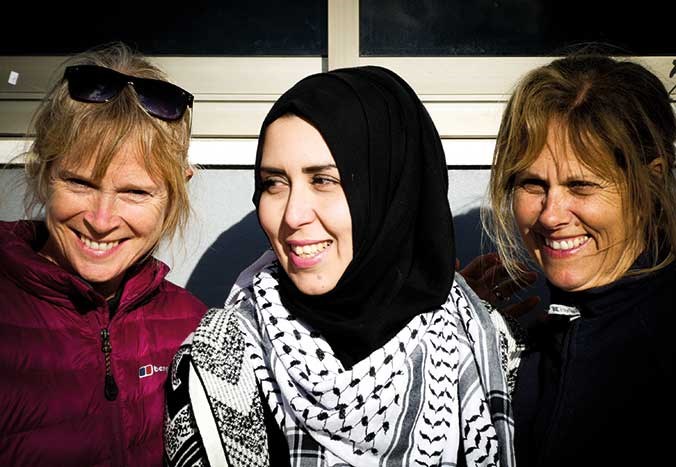
Rebuilding Hope: Lolo Kh Ak (centre) with two Amos Trust volunteers from the UK.
— — — — — — —
“The soldiers have the right to shoot and kill. We (the ladies from the families) were so afraid for our husbands. We had to make sure they stayed calm, and then we just prayed. Finally, three big bulldozers came in, and it took them just three hours to demolish the whole thing. Then they shook each other’s hands and gave one other high fives. Mission accomplished, and they left.”
People notice that a clock ticks loudly on the kitchen wall while waiting for Lolo to continue.
“That feeling we experienced on that night is unforgettable. Even if you had a hundred houses, you would never forget what you have been through. It was not just the demolition of a house built with stones but the demolition of every hope and dream built with every stone. So to see 400 soldiers and three bulldozers demolishing your home in the middle of the night without any reason and not being able to do anything — nothing is harder than that.”
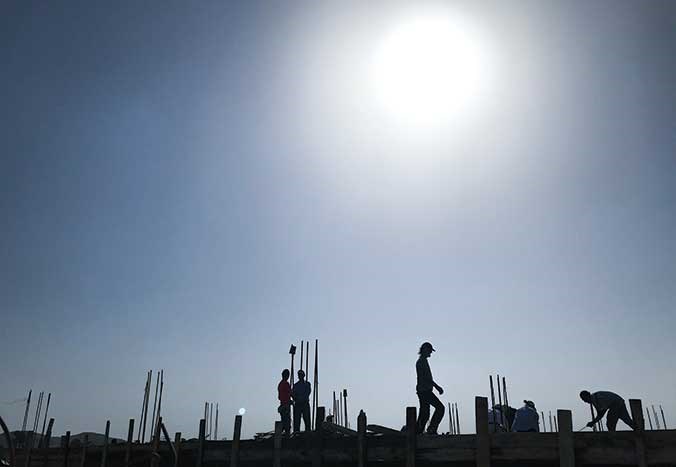
Up On The Roof: Work continues on the roof of Lolo’s family home. Between 2017 and 2021, just 33 building permits were given to Palestinian landowners in Israeli-controlled areas of the West Bank.
— — — — — — —
Lolo told her story in the home that a team of UK volunteers from Amos Trust had helped to rebuild in 2019, alongside a team of local builders and our Palestinian partner Holy Land Trust. Since then, her family has been threatened with a daily fine of 250 shekels (£65) which has now built up and they owe several hundred thousand shekels for building without permission.
“That feeling we experienced on that night is unforgettable. Even if you had a hundred houses, you will never forget what you have been through.” Lolo
Since 2006, over 1,500 Palestinian homes have been destroyed by the Israelis in Israeli-controlled areas of the West Bank. In addition, between 2017 and 2021, just 33 building permits were given to Palestinian landowners living in these areas, while at the same time, illegal Israeli settlers were granted 16,500 building permits.
To find out more about Amos’ home rebuilding programme in Palestine, please visit our website at amostrust.org/home-rebuilds
— — — — — — —
2. I like to cook pap
Simy and her five housemates are the first group of young women on Umthombo’s Independent Living programme.
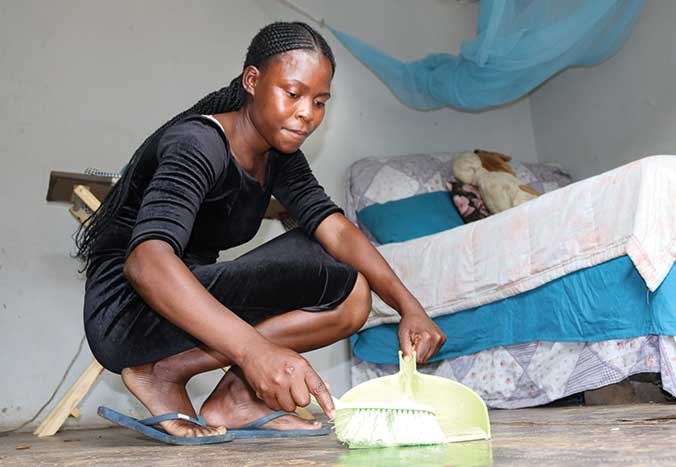
Chores: “This is a cool place to live. Everything is fine here.”
— — — — — — —
“I like to cook Pap and tripe. I like dry pap. They give you putu, not pap, in Zimbabwe.” Simy rolls the final ‘u’ in putu as she makes a dismissive gesture with her hands. “I know how to cook putu (maise porridge). I used to have putu all the time, and I didn’t like that. In Zimbabwe, it was just putu, rice and vegetable (cabbage). I like pap.”
Simy carries on unloading the box of groceries that Umthombo has just delivered to her.
“This is a cool place to live. Everything is fine here. I like it. This place — it is safe here. I wake up early every day at 6:00. By 8:00, I’ve done my washing and cooking — I’ve done everything.
“I have lived in eThkwini (Durban) since 2014. I came here from Bulawayo in Zimbabwe to look for a job. My husband came first, and then I followed him. I met Umthombo in 2018. I was staying in Maracanã, (a large, abandoned building in downtown Durban named after the Brazil football stadium). It’s not a good place, it’s a dead place. All the time, people on alcohol, drugs are there. So Umthombo, they met me there and talked to us.
“I have my own stall now. I can’t believe it. I think, is this me or is this not me? It’s like maybe I’m dreaming. I want to be a businesswoman. I want my own restaurant. But that is so difficult.” Simy
“Right away, I said, ‘I want to be in the Young Women’s project.’ I have been involved in lots of things because of the project. Before I wasn’t working, I was just staying there drinking alcohol — too much alcohol. Now I am working and my child is at school too. So Umthombo helped me get the Child Support Grant (available once a child is in school/crèche), and now they give me food and pay rent for me to live here.”
Simy points around the room at her bed and oven, at the saucepan full of pap that she had cooked earlier that morning and the pictures she has stuck on her wall. She has already shown us the courtyard and shared toilets belonging to this small complex, which is now home to her and the five other young women from Umthombo Young Women’s Project.
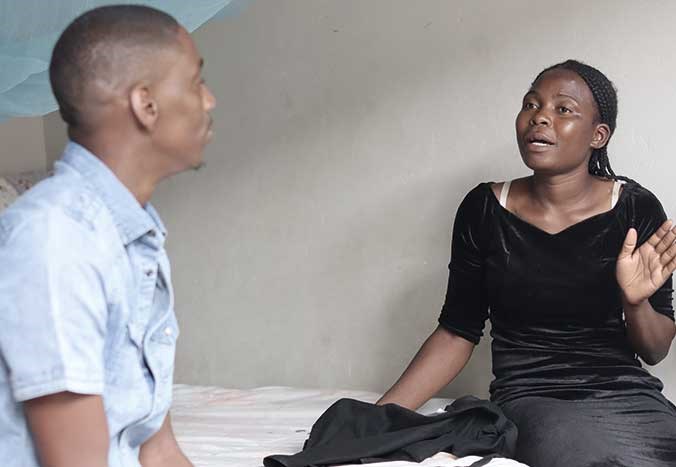
Early Riser: “I wake up early every day at 6:00. By 8:00, I’ve done my washing and cooking — I’ve done everything.”
— — — — — — —
It is desperately difficult for young women to break the connection with the streets. It is challenging for young men too, but often they can be reintegrated back into their families or community. For young women, this is often impossible, as their family or community may represent the abuse they are running from or because they are simply not welcome at home.
Simy and her housemates are the first group of young women on Umthombo’s Independent Living programme, which Amos Trust supports. It is one of the fruits of the On Her Terms project, and it has taken five years and many ups and downs to get to this point. The programme seeks to give young women the support they need to live life on their terms. Already, other young women who felt unable to take this step away from the streets, are now determined to make the same journey.
“I have my own stall now. I can’t believe it. I think, is this me or is this not me? It’s like maybe I’m dreaming. I want to be a businesswoman. I want my own restaurant. But that is so difficult.
“I don’t want to always have to look up and say ‘Good Morning’ to everyone while they look down on me. I want someone to say: ‘Good Morning Madam’ to me.” Simy
The next step to get there, whoa... that is hard because things are not going well (in South Africa). So now I am selling cheepsa/fat cakes (South African donuts), drinks and airtime (phone credit). How am I supposed to do more, save, and buy bigger pots, food and gas?”
Simy’s face breaks into the widest smile as she concludes, “But I will do it. I will run my own business. I can do it. It is my dream. I don’t want to always have to look up and say ‘Good Morning’ to everyone while they look down on me. I want someone to say: ‘Good Morning Madam’ to me.”
To find out more about Umthombo, our partner in South Africa, please visit amostrust.org/umthombo
— — — — — — —
3. We believe in trees
“People don’t believe the wonderful work that trees can do.”
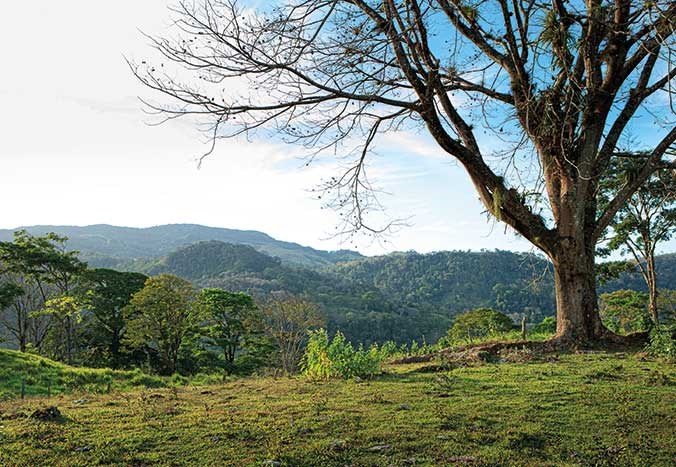
Growing: We are one year into a new five-year cycle with seven communities surrounding Teustepe in the Boaco region of Nicaragua.
— — — — — — —
The tiny, white, cotton wool bundle languidly stretched, hooking one, then a second claw onto the branch — letting its body fall. The presence of sloths (especially baby ones) signifies a healthy forest. Twenty years ago, Cepana was a barren cattle ranch with one or two trees and topsoil leached of nutrients by UV rays and over-grazing. Juan Carlos, Cepana’s manager says, “You could see from here to the horizon; there were almost no trees. The spring was dry.”
Today it is verdant with all kinds of trees, coffee and fruit plants. CEPAD , our partner in Nicaragua, uses Cepana to teach farmers new agricultural techniques. At Cepana, farmers learn the importance of developing canopy cover, how to increase organic matter in the soil, how to create natural fertilisers and pesticides and how to use cuttings effectively.
It is also home to two streams. The water table has improved dramatically by planting thousands of trees, and the spring has been revived. Neighbouring communities can now come and take drinking water, learn more about water management and learn how to make CEPAD’s simple, sustainable water filters.
“You could see from here to the horizon; there were almost no trees. The spring was dry.” Juan Carlos, Cepana’s manager
Amos Trust supports CEPAD ’s work in Nicaragua’s dry belt. We are one year into a new five-year cycle with seven communities surrounding Teustepe in the Boaco region. Six of these communities are desperately short of water and are already experiencing the devastating impact of climate change, and they know it will only worsen.
We believe in offsetting and tree planting — but not in an attempt to justify a lifestyle built on our consumption of fossil fuels. We do not believe in devastating virgin forests for a few years of cattle farming and then replacing native species with fast-growing, often completely unsustainable new trees.
We believe offsetting should be used to fund the planting of trees where they are part of a sustainable response to reduce some of the impacts of climate change. For example, in tropical climates, the increase in canopy cover can lead to the creation of micro-climates. The impact of trees on local temperatures is only just being understood; they have a far greater effect than would be expected purely through the increased shade.
We believe in trees that will increase the food groups that people can eat, that can be used to feed livestock, that can be composted into natural fertilisers and will reclaim barren ground. We believe in trees whose taproots can draw water from deep beneath the earth. We believe in trees as we are not the only species that depend on them, and because we are only just starting to understand these species which predate us by millions of years.
No one should be foolish enough to suggest that tree planting is enough — just as our consumer choices can barely touch the impact of the vested interests that seem determined to decimate our world. But it is a vital part of the integrated responses developed by CEPAD , which we are delighted to support. And we want more people to be involved in this offsetting because as Juan Carlos, coffee grower and manager of Cepana, says, “People don’t believe the wonderful work that trees can do”.
To read more about CEPAD , please visit amostrust.org/cepad
— — — — — —
4. Banned On The Run
We recently visited Ramallah to meet two Palestinian civil society organisations that Israel has declared terrorist entities.
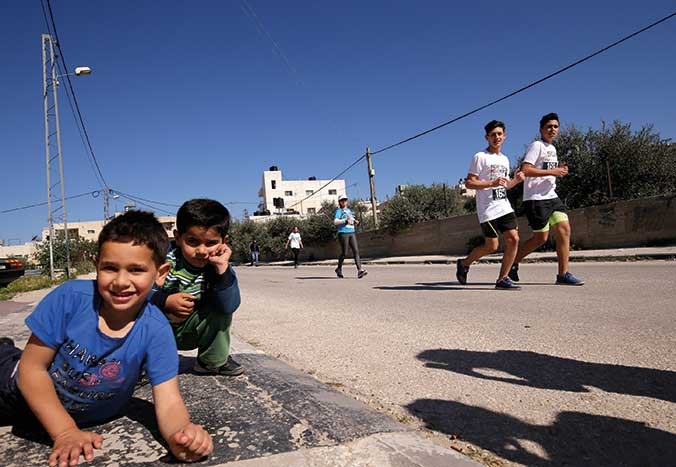
Round & Round: “The full marathon is a repeat of the half, as there’s not 26 miles of continuous Palestinian-controlled land to run on.”
— — — — — — —
If you are travelling through Palestine and Israel, you have to navigate a three day weekend. We had not been back to Palestine since concluding the first part of Walk The West Bank in November 2019; then, we had spent our last nights at a hotel in Beit Sahour (the neighbouring village to Bethlehem) as Bethlehem’s inns were full. Going back this March was to a very different landscape — a much quieter Manger Square with only a handful of hotels, tourist shops and cafes starting to open.
Each year for the Palestine Marathon, we coalesce outside Dar Nasser bistro/cafe on the steep slope of Manger Street that leads to the start and finish line in Manger Square. Our friends from Right to Movement usually gather there as well. This year, it was particularly good to join with these young Palestinians who had taken part in Run The Wall with us a few weeks earlier.
It’s at this brutal last hill when people most appreciate the support. They are also, by this stage, running so slowly that pictures are easy to take, and most importantly, Dar Nasser serves excellent coffee. This year they opened their doors for the first time in two years for the marathon. The next day, they were firmly shut again.
Going back this March was to a very different landscape — a much quieter Manger Square with only a handful of hotels, tourist shops and cafes starting to open.
The popularity of the 10k and 5k runs have squeezed out the half and full marathons to an earlier time slot. 2018’s heatwave also contributed to this, when most people who completed the full marathon were internationals (some from Amos). The half — favoured by local runners — is a great thereand- back run. It’s lumpy (or technical), but unlike most other half marathons, it includes running through two refugee camps, along the Separation Wall and around the occasional flock of sheep. The full marathon is a repeat of the half, as there aren’t 26, or even 13 miles of continuous Palestinian-controlled land to run on.
The 10k has the best start, which seems to go on and on. Young people sprint down the hill past us — some crash into the concrete bollards and limp down the rest of the slope. More experienced runners try to hit their stride while avoiding those walking the 10k, leisurely chatting as they stroll down the hill. The 5k is a real family event with numerous strollers and buggies. This year over 5,000 took part in these two runs and as Elias D’eis from Holy Land Trust says: “The Marathon — it’s as big as Christmas now in Bethlehem.”
While our weekend started with the Friday Marathon in Bethlehem, Saturday and Sunday would be spent in Ramallah. It is always a lottery for Palestinians to know how long it will take to drive around Jerusalem (access to the city is denied to them); Bethlehem is south of the city and Ramallah is to the north. This is partly due to Israeli checkpoints, the quality of the road and its steep inclines and descents, but it is also because of difficulties making it through Al Eizariya (the biblical Bethany).
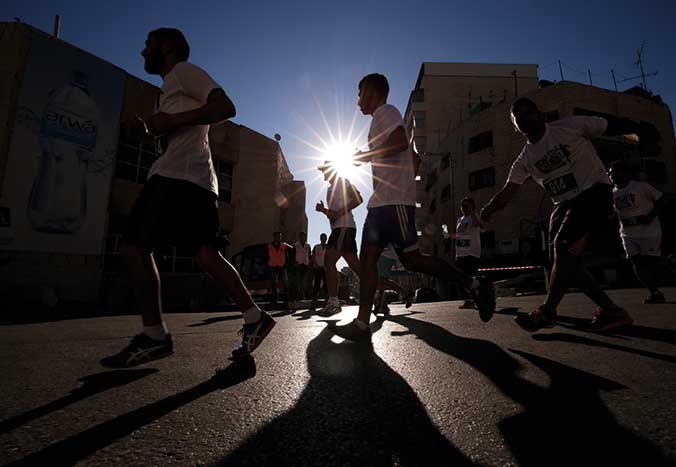
Obstacles: “... unlike most other half marathons, it includes running through two refugee camps, along the Separation Wall and around the occasional flock of sheep.”
— — — — — — —
Donald Trump identified Al Eizariya as the future of East Jerusalem — the capital of a new Palestinian state. It had always been part of Jerusalem until the Apartheid Wall was built, and its Palestinian residents were denied access. It is now in Area C, which means it’s under Israeli military and civil control. As the Israelis have no interest in how the traffic flows through this overcrowded city, it often comes to a standstill.
This year over 5,000 took part in these two runs and as Elias D’eis from Holy Land Trust says: “The Marathon — it’s as big as Christmas now in Bethlehem.”
We are in Ramallah to visit two of the six leading Palestinian civil society organisations Israel recently declared terrorist entities — Defence for Children International (DCI) and Al Haq. It is hard to imagine two organisations less guilty of the accusation. DCI focuses on children’s imprisonment, arrest and killing by the Israel Defence Force which makes them unpopular with the Israeli State.
Al Haq is a legal organisation whose support of the International Criminal Court’s investigation of Israel for war crimes committed in Gaza means that Israel now seems to want to stop international support flowing to them. So far, the Israeli policy of a bureaucratic offensive has not worked, but its long, drawn-out approach aims to make it harder and harder for funders and donor countries to work with them. They are genuinely inspirational organisations.
Ramallah also means a visit to Palestine’s first Road and Mountain Bike shop, ‘Palestine Riders’. There’s a brilliant team of people involved in To find out more about our work in Palestine, please visit amostrust.org/palestine-justice To watch all the Amos webinars again, please visit amostrust.org/amos-webinars this undertaking and its sister project in the Am’ari refugee camp. When we did our Giro Alla Palestina in 2018, we struggled to find local riders — it is fantastic now to find others who want to challenge themselves on the beautiful hills of Palestine.
Their beauty is reflected in Raja Shehadeh’s ‘Palestine Walks’, and was one of the reasons why Amos was so quick to respond to the idea of 2017’s Just Walk to Jerusalem. It remains an inspirational read. The webinar we ran with Raja in December 2020 was not only deeply enjoyable but was matched only in popularity by the guided tour of Gaza with We Are Numbers and our Palestine Pancake Party.
To finally meet Raja and his wife Penny over lunch, and to discuss his forthcoming book — his take on the labelling of Al Haq as a terrorist organisation (Raja was one of the founders) — was a huge privilege.
To find out more about our work in Palestine, please visit amostrust.org/palestine-justice. To watch all the Amos webinars again, please visit amostrust.org/amos-webinars
— — — — — — —
5. Consequences
“I thank Cheka Sana so much for all the help. I am from another country, but still, they took me in and helped me.”
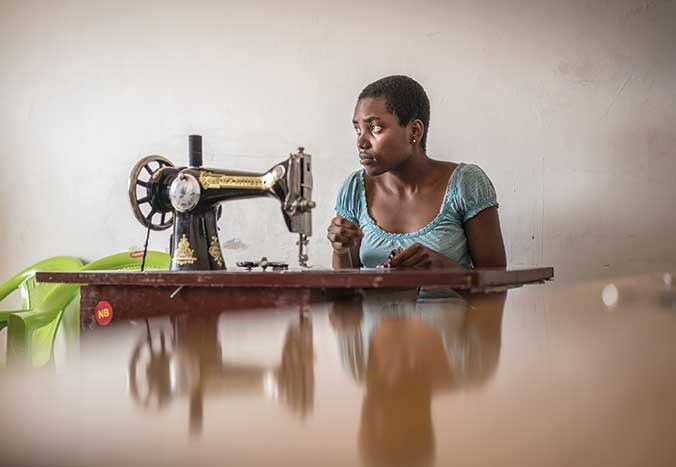
Sew & Sew: Cheka Sana supports young women to start small businesses.
— — — — — — —
Occasionally, the unintended consequences of our actions do not make things worse; they create the possibility for people’s deepest longings to come true. In 2019, we held an On Her Terms workshop with Cheka Sana in Mwanza, Tanzania. We brought together our partners and friends from Burundi, Kenya and Tanzania for a week-long exchange of learning about working with young women on the streets. Frontline workers who experienced Cheka Sana’s work model gave their feedback and looked at how they could implement various parts of it.
Teddy, the programme lead from New Generation Burundi, wanted to take the chance to learn from Cheka Sana and other organisations in Tanzania. At one of these, Wote Sawa, he translated for a Burundian girl who had got trapped inside Tanzania.
Two years later, in July 2021, Cheka Sana met another young woman from Burundi on the streets of Mwanza. Aziza* was 15 years old and six months pregnant. Cheka Sana’s outreach workers befriended her and offered her the chance to move in with a temporary foster mother. This provided a safe place for her and allowed them to learn more about her background and find out what she wanted for herself and her baby.
In 2019, we held an On Her Terms workshop with Cheka Sana in Mwanza, Tanzania. We brought together our partners and friends from Burundi, Kenya and Tanzania for a week-long exchange of learning about working with young women on the streets.
Aziza is the third child of five from Kibhasi, Burundi. Her parents were farmers. When they could not grow enough food on their land, they would either travel together to Ngara in Tanzania to work on people’s farms or send Aziza there on her own to work. When she was ten, she decided it was time to leave and move to Mwanza in Tanzania to find better work.
She worked as a house help in a family home for the next five years until she became pregnant by a married man and was kicked out. After Aziza left, the baby’s father stepped in and took her to live with his mother. Aziza says, “When I moved in there, they did not feed me, and my mother-in-law kept beating me. So I decided to run away and to live on the streets.”
It was here that she met the Cheka Sana team. As well as providing her with a foster home, they also provided her with pre- and postnatal care and began building her life skills through 1:1 and group sessions, and regular psychosocial support. She learned about sexual and reproductive health and gender-based violence. And, through their regular women’s only self-defence classes, she learnt about her rights. How to say Hapana — (No!), and how to defend herself. Gradually her self-esteem and self-confidence grew. Aziza says, “Now I know my rights and responsibilities as a girl child and how to take care of myself.”
“When I moved in there, they did not feed me, and my mother-in-law kept beating me. So I decided to run away and to live on the streets.” Aziza
On 21st October, Cheka Sana paid for Aziza to give birth at Mwanza Regional Hospital, and provided her with baby clothes and the other essentials she needed for her baby girl. As she held her child, Aziza knew that she wanted to return to her family in Burundi. Cheka Sana remembered Teddy from New Generation and got in touch to see if they could help her make this move.
The process won’t be easy. New Generation will need to make sure that the move will be safe for her and her baby, while Cheka Sana will support Aziza as the reality of such a move sinks in. Once a move has been made, they will then look to place her in New Generation’s Young Women’s Entrepreneurship Programme, as Aziza dreams of running her own small business and being able to provide for her daughter.
(* name changed.)
To read more about Cheka Sana, please visit amostrust.org/cheka-sana-tanzania
— — — — — — —
6. Under An English Sky
“Chris, we have to speak. We have been left a legacy. The solicitor has to speak to you today before she goes on holiday.”
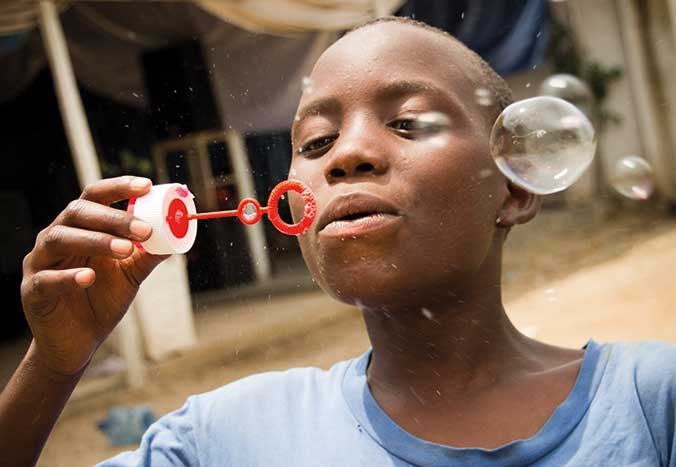
Legacy: One person’s decision to leave Amos a legacy has had a massive impact on us.
— — — — — — —
“What? Nive, I can’t hear you. We’ve got a what?” Somehow we think that if we shout louder into a phone it will get through — like a British tourist visiting Europe meets a Dom Jolly TV sketch. “Chris, we’ve got a…” the signal dropped, and Nive’s voice was lost.
It’s 2017 and I’m walking to Jerusalem — well, actually into Canterbury on day five of Just Walk to Jerusalem, our 2,500 mile walk to Palestine, to apologise for the Balfour Declaration. It’s the Kent countryside in June. We are walking ‘under an English sky’, and you can understand why, a hundred years earlier, Rupert Brooke waxed lyrical about England on his way to the Great War.
In the morning, as a group, we’d read the poem that had inspired our planning and would shape much of our journey — Derek Mahon’s ‘Everything Is Going To Be Alright’. Its conviction would lead us on, even though the reality was that we had set off on a trip with no idea how it would balance out financially. The concern that it might bankrupt us was never far from the thoughts of Nive (who leads on our finances) and our Trustees.
Still no signal, but then a text alert comes in: “Chris, we have to speak. We have been left a legacy. The solicitor has to speak to you today before she goes on holiday.”
“I am lost for words. It is seven times higher than any previous donation or legacy that we’ve received. Not only will Nive be able to sleep in peace tonight and for the rest of the Walk, but it will allow us to implement several new projects formulated on our journey.”
I text back asking how much for, and Nive sends me a copy of the will. We spend the next hour reading and re-reading the document until the signal is restored. I am lost for words. It is seven times higher than any previous donation or legacy that we’ve ever received. Not only would Nive be able to sleep in peace that night, and for the rest of the Walk, but it would allow us to implement several new projects formulated on our journey.
It would allow us to appoint Karin to lead a brand new project — On Her Terms — to work with our street child partners to transform the lives of girls on the streets, who have been consistently failed by society. Four years later, so many young women are feeling the impact of this work. Moreover, the learning developed by our four partners is being shared with others who are keen to know how they, too, can respond.
A person’s decision to leave Amos a legacy can have a massive impact. We want to use gifts like these to help us develop new and creative projects. In this way, legacies provide the resources needed for those undertakings that we believe in, but don’t yet have the funding for.
And while a significant legacy like this is remarkable, we feel the impact of the smaller legacies just as powerfully; whether this is a collection at a funeral, a 10% tithe spread between several charities or someone who has no descendants and wants their money to be used for the greater good.
A person’s decision to leave Amos a legacy can have a massive impact. We want to use gifts like these to help us develop new and creative projects.
Over the last two years, too many people we know have passed away. We feel deeply privileged that when feeling crippling loss, the family and friends of these people choose to donate to us and our work by leaving us a legacy. It is our responsibility to use this money in the most effective ways we can, and in doing so, honour their memory.
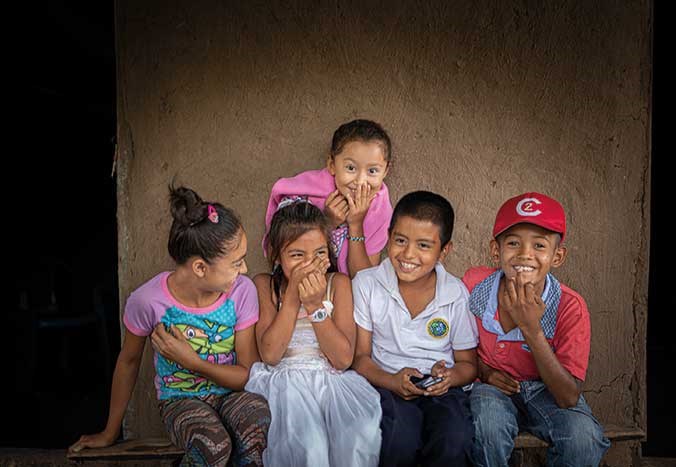
Play time: “We saw the work of Amos Trust whilst in Nicaragua and wanted to make sure our commitment would continue whether we were around or not. It was a simple and natural thing to make sure we left enough money in our wills to ensure this happened.” Sue, Amos supporter
— — — — — — —
We are now using these legacies to establish several new initiatives with our partners and friends worldwide to increase our ability to advocate on their behalf. We are particularly delighted to have been able to launch the Amos Trust Climate Fellowship, a project to support young women activists from the global south who are tackling the impact of climate change in their communities.
The Fellowship aims to create a self-supporting network of climate activists that will amplify their stories and work, give them greater prominence and provide small grants for them to develop their work further. We could not have committed to this if it were not for people’s legacies and the gifts given in their memory.
For information about how to leave a legacy to Amos Trust, please visit our website at amostrust.org/leave-a-legacy
— — — — — — —
Writers: Chris Rose with Nick Welsh and Jill Howard
Photographers: Mark Kensett, Rebekah McKay-Smith, Simphiwe Mdunge, Tom Merilion, Darrian Traynor, Nick Welsh and Peter Woodall
— — — — — — —
A Little More...
More First Of The Month
Older editions of our First Of The Month essays are available to read and download here.
Words Of Hope E-news
Sign up to receive our regular ‘Words Of Hope’ emails and keep up to date with all the latest Amos news and information, including details of our trips and events, news from our partners around the world and all of our campaigns.
Online reflection
Join us every Tuesday at 5pm for ‘Words Of Hope’ — our online reflection. Simply click here to join us a few minutes beforehand.
Amos Trust
7 Bell Yard, London
WC2A 2JR
UK
Telephone:
+44 (0) 203 725 3493
Email:
[email protected]
Registered Charity No.
1164234

This item has been added to your shopping basket. Please click on the Checkout button below where you can choose your quantity.
Continue shopping Checkout Close